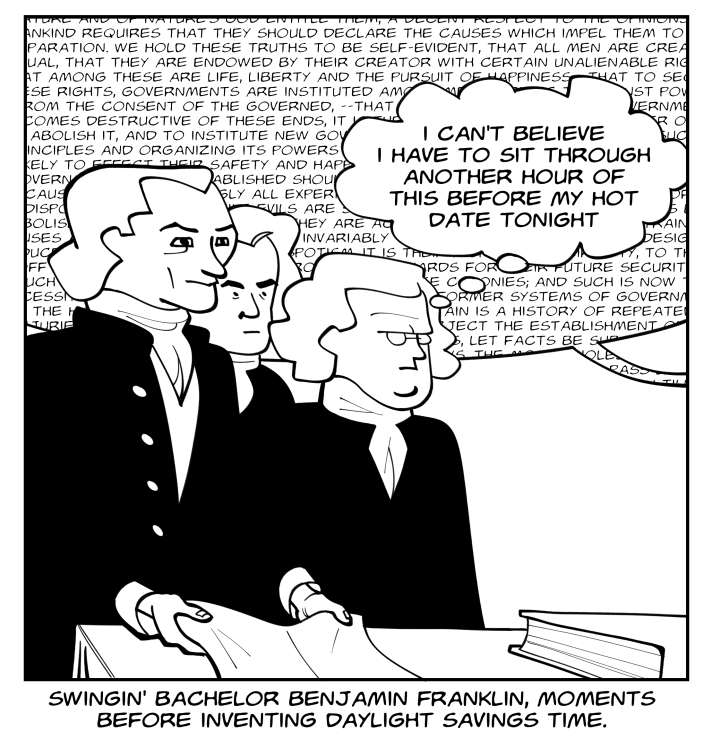The shady history behind DST

Comic by Parris Mook-Sang-Forbes.
You wake up in the dark. You spend all day inside, baking under fluorescent lights. You walk home in the dark.
Daylight savings time (DST) is supposed to combat this, but even living as far south as we do, it doesn’t do the job. Yes, we just returned to standard time, having advanced our clocks an hour in the spring, but an extra hour of sleep is little consolation for mid-afternoon sunsets.
Daylight savings time (DST) once served a purpose, but since then it has become obsolete. Perhaps its superfluity alone warrants our doing away with it, but Canada initially implemented it for a more sinister reason we ought to know about and question.
DST began as a joke. In 1784, Benjamin Franklin wrote a satirical letter to the editor of a French newspaper declaring Parisian citizens might save on their expensive candles by organising their workday according to the daylight. While DST wasn’t invented for a while later, this is the earliest example of this idea.
If someone (for some reason) knows anything about the history of DST, they might tell you that Germany was the first country to officially adopt it in 1916, and this is…only sort of true. Germany was the first nation to make the mistake that is DST, but Canada beat them to it on a technicality.
In 1908, the town of Port Arthur, Ontario, or the area we now know as Thunder Bay, began using DST, though they conceptualized it differently than we do.
At the time, John Hewitson, a minor businessman who was big into consuming sunlight, petitioned the town council to switch from their typical Central Standard Time (CST) to Eastern Standard Time (EST) for the summer months only. The council agreed, and for some reason, I’m not surprised it was Canada who first thought this thing was a good idea.
Then, on March 19, 1918, American Congress passed its first national law concerning DST, ostensibly so labouring Americans could be thriftier with their coal consumption. Though the technology had changed, this reality was not so different from the comical fantasy Franklin had concocted 134 years beforehand.
Ostensibly. Perhaps your average American did use less coal thanks to DST, but they lost more money because of it. It’s speculated that the U.S. Chamber of Commerce backed the bill that enacted DST because it foresaw that, if Americans got off work while it was still light out, they would be more likely to go shopping after a shift, thus spending more of their income and perpetuating a culture of consumerism.
Also in 1918, less than a month after America, Canada implemented DST nationwide. Let me be clear: I don’t think DST is a conspiracy theory, although I think that would be funny. Both America and Canada were still at war in 1918, so our governments wanting to increase both consumption and production is understandable. In fact, “increasing production” is the reason for implementing DST that the Canadian federal government officially cites.
But as I mentioned above, DST once served a purpose, and it has since become both obsolete and an opponent to my mental health.
Canada followed in America’s footsteps to, at least in part, galvanise unnecessary expenditure. On one hand, I doubt DST does this anymore — novel technologies like online shopping encourage impulsive late-night purchasing just fine. On the other hand, just because something else has picked up DST’s slack, this doesn’t mean that DST is off the hook.
The origins of DST point to how deeply entrenched consumerism is in Canadian society. Acknowledging these origins might be a significant step towards combating consumerism itself, and we can only truly claim we’ve acknowledged the history of consumerism until we’ve uprooted the things that circulate it, like DST.
Also, I hate it when it gets dark out at 4 p.m.






